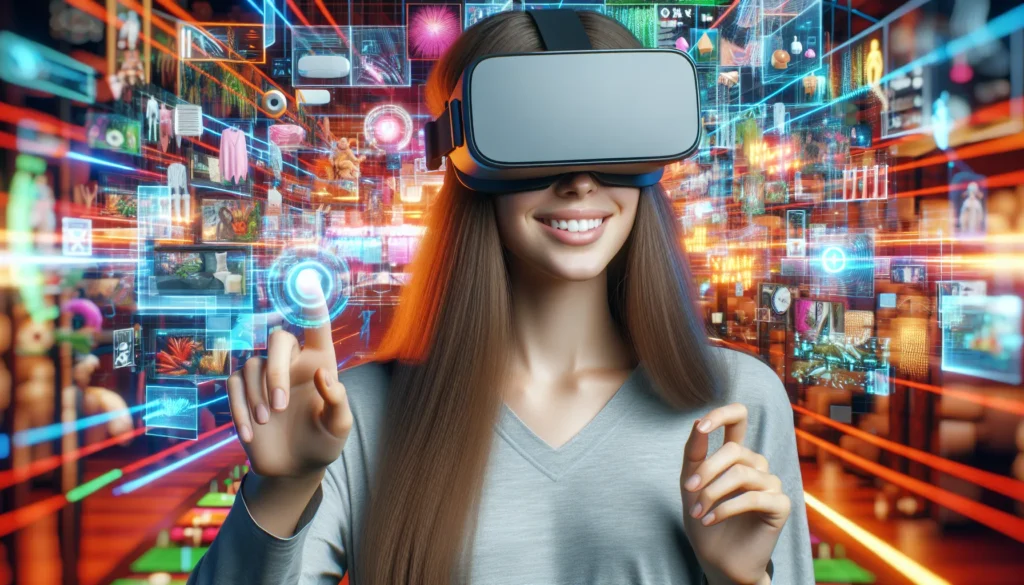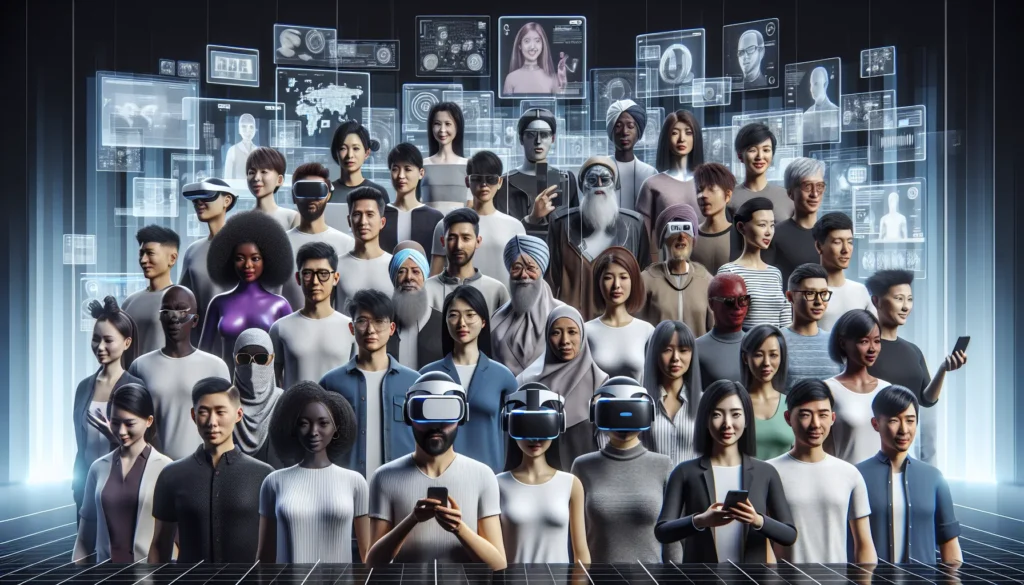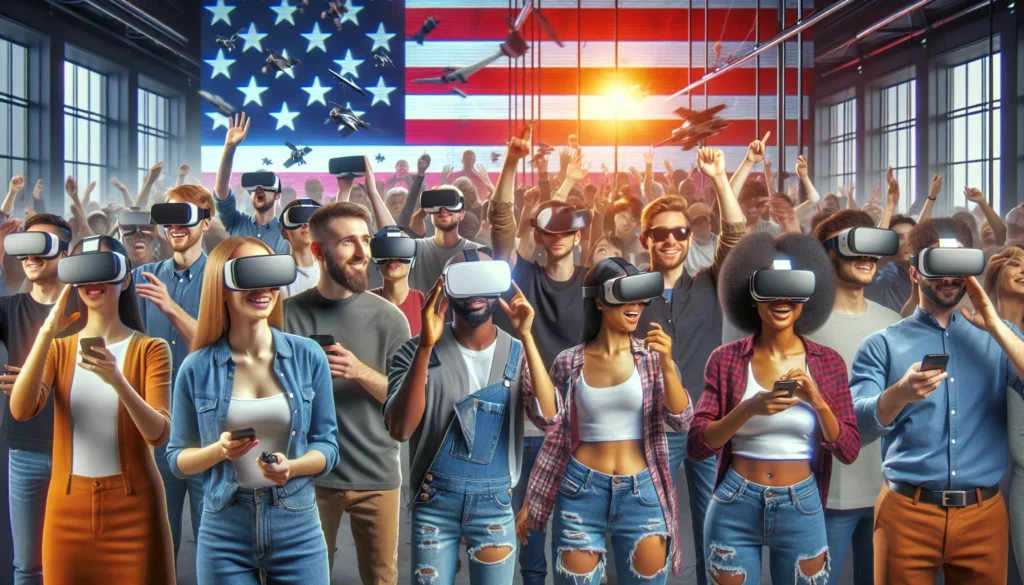Imagine a world where your brand can interact with customers in immersive digital spaces, creating experiences that feel almost real. That’s the promise of the metaverse—a virtual universe where people connect, socialize, and engage in ways that go far beyond traditional online platforms. As this digital frontier grows, businesses are discovering new ways to market, connect, and build relationships within these dynamic environments.
Metaverse marketing is reshaping how you approach your audience. It’s not just about ads or posts; it’s about creating interactive, meaningful experiences that resonate. Whether it’s through virtual storefronts, branded events, or unique digital assets, the metaverse offers endless possibilities to captivate and engage. If you’re ready to explore the next evolution of marketing, understanding the metaverse is your first step.
What Is Metaverse Marketing?
Metaverse marketing uses virtual spaces, augmented reality (AR), and digital environments to connect with customers in immersive ways. Unlike traditional methods, it prioritizes engagement through interactive experiences rather than static promotions.
Campaigns often include virtual reality (VR) activations, gamified brand interactions, and non-fungible token (NFT) collaborations. For instance, brands create virtual stores where users explore products in 3D or host events where customers interact as avatars. These approaches enhance customer engagement while building brand loyalty in a dynamic, tech-forward manner.
By blending advanced technology and creative strategies, metaverse marketing allows you to reach digital-native consumers. Its focus on creating shared experiences gives your audience a deeper connection to your brand within immersive ecosystems. Maximizing these environments requires understanding platform-specific tools and consumer behaviors.
Key Components Of Metaverse Marketing

Metaverse marketing relies on several innovative elements to create engaging and immersive customer experiences. These components leverage advanced technology and creative strategies to connect with your audience in unique ways.
Virtual Environments And Experiences
Virtual environments form the foundation of metaverse marketing. These spaces, such as virtual storefronts, branded islands in games, or interactive showrooms, offer immersive experiences where users can engage with your products or services. For instance, you can create a fully interactive virtual space where customers explore 3D product displays, interact with digital representations of your brand, and participate in unique activities. These environments enhance brand visibility while delivering memorable consumer experiences.
Digital Avatars And Personalization
Digital avatars allow users to represent themselves and interact within metaverse spaces. This personal connection fosters stronger customer engagement by enabling tailored experiences. For example, you might enable users to customize their avatars with branded clothing or accessories, turning your products into digital assets within the virtual world. Offering exclusive avatar skins or personalized interactions based on user preferences can increase brand loyalty and create a deeper emotional connection.
Immersive Technology Integration
Immersive technology like augmented reality (AR), virtual reality (VR), and blockchain enhances metaverse marketing efforts by making interactions more realistic and impactful. AR can bring your real-world products into virtual spaces, while VR enables fully immersive branded simulations. Blockchain technology supports the creation of secure and verifiable digital goods, such as NFTs, ensuring authenticity. Combining these technologies allows your brand to deliver dynamic, multi-dimensional experiences that captivate your digital-native audience.
Benefits Of Metaverse Marketing

Metaverse marketing offers unique advantages, transforming how your brand connects with customers. It creates immersive experiences that drive deeper audience engagement and expand your global reach.
Enhanced Brand Engagement
Metaverse platforms deliver immersive environments where your brand can foster meaningful connections. Customers interact with your virtual stores, games, or events rather than passively viewing ads. For instance, launching gamified experiences or virtual reality activations increases time spent with your brand, strengthening loyalty and recall.
Innovative Customer Interactions
Using AR, VR, and interactive tools, you enable dynamic customer interactions. Customers can explore 3D versions of products, attend virtual launch events, or customize digital avatars. These personalized and engaging activities make your offerings memorable. For example, hosting an event where users participate as avatars builds excitement and a sense of inclusion.
Global Reach And Accessibility
The metaverse removes physical and geographical barriers, allowing you to connect with global audiences. Virtual events and environments, open 24/7, reach customers in any time zone. For example, creating branded spaces in popular metaverse platforms broadens your accessibility, making it easier for diverse consumers to discover and interact with your brand.
Examples Of Metaverse Marketing Strategies

Metaverse marketing strategies leverage immersive digital tools to engage audiences in creative and interactive ways. These approaches redefine customer interaction by offering unique, memorable experiences.
Virtual Events And Sponsorships
Virtual events in metaverse spaces offer scalable, engaging opportunities for brand interaction. You can sponsor virtual concerts, gaming tournaments, or industry expos to position your brand in front of targeted audiences. Platforms like Decentraland and Roblox host events with customizable branded venues. Examples include live-streamed performances where your brand integrates into the environment, such as logos on digital stages or branded virtual items distributed to attendees.
Virtual Goods And NFT Marketing
Branded virtual goods and NFTs create exclusivity, driving customer engagement and loyalty. You can launch limited-edition digital items, such as branded apparel for avatars or collectible content tied to your brand. High-profile examples include Gucci’s virtual sneakers for avatars in Roblox and Taco Bell’s NFT artwork. These assets provide value while reinforcing brand visibility within the metaverse ecosystem.
Gamified Brand Collaborations
Gamified experiences integrate your brand directly into metaverse games or platforms. Collaborations can include branded quests, challenges, or virtual spaces designed for user engagement. For instance, you could partner with Fortnite or Minecraft to create interactive missions that showcase your products. Nike’s NIKELAND in Roblox engages users through interactive sports games, blending entertainment with marketing seamlessly.
Challenges In Metaverse Marketing
Metaverse marketing offers vast opportunities but comes with significant challenges. Addressing these obstacles is essential to unlock the platform’s full potential for your brand.
High Entry Costs
Engaging in metaverse marketing often requires substantial investment. Developing virtual environments, hosting immersive events, or creating branded digital assets involves advanced technology and skilled professionals. Smaller brands may face financial barriers to accessing the tools and resources necessary for competitive campaigns.
Privacy And Security Concerns
Privacy and security risks are prevalent in the metaverse. Customer data, including interactions and behavioral patterns, is collected extensively, increasing the potential for breaches or misuse. Transparent data policies and robust security measures are vital to ensure compliance with regulations and maintain customer trust.
Adoption Limitations
Adopting metaverse platforms is hindered by technical and demographic gaps. Not all users have access to AR/VR devices or high-speed internet, limiting participation. Additionally, widespread adoption depends on growing familiarity with virtual environments, particularly among non-digital-native audiences. Overcoming these barriers requires strategic inclusivity and user education.
The Future Of Metaverse Marketing
Metaverse marketing continues evolving as technological advancements reshape consumer expectations. Emerging trends point to deeper integration of AI and machine learning to personalize user experiences within virtual spaces. These technologies analyze data to craft tailored interactions, such as recommending products in a virtual store based on user behavior or preferences.
Brands are expected to increasingly adopt decentralized platforms powered by blockchain. These platforms enhance transparency and ownership, allowing customers to engage with authenticated assets like NFTs or tokenized loyalty rewards. This shift empowers you to create more trust-driven relationships within a decentralized ecosystem.
Mixed reality experiences combining AR and VR elements are likely to dominate. You can expect future campaigns to merge physical and digital realities, offering customers seamless ways to interact with products. For example, users could virtually try on clothing in AR before purchasing in real-time.
Scalable marketing tools optimized for different demographics are gaining relevance. As the metaverse expands, addressing accessibility challenges ensures your campaigns reach global, diverse audiences. Simple, mobile-friendly applications for emerging markets and high-end VR options for tech-savvy users tackle varying adoption levels effectively.
Expanding cross-industry collaborations in the metaverse open avenues for innovation. Partnerships between fashion, gaming, and entertainment brands create multi-dimensional experiences that spark user engagement. For instance, hosting branded events in gaming platforms featuring live performances may combine entertainment with shopping seamlessly.
The emergence of virtual economies highlights opportunities for monetization. You can leverage in-world assets, subscriptions, or ad spaces within virtual environments to diversify revenue streams. Dynamic advertising in interactive spaces replaces static messaging, making your campaigns more engaging and adaptable.
Conclusion
Metaverse marketing is reshaping how you connect with your audience by merging technology with creativity to deliver immersive, interactive experiences. As this digital frontier continues to evolve, it offers limitless potential for brands willing to embrace innovation and adapt to new consumer behaviors.
By exploring the metaverse’s tools and opportunities, you can position your brand at the forefront of this transformative shift. Whether it’s through virtual events, gamified collaborations, or personalized digital assets, the metaverse opens doors to deeper engagement and global reach. Now’s the time to start exploring how your brand can thrive in this dynamic virtual landscape.
Frequently Asked Questions
What is the metaverse in marketing?
The metaverse in marketing refers to virtual environments where brands can interact with customers through immersive experiences like virtual stores, events, and gamified interactions. It uses technologies like augmented reality (AR), virtual reality (VR), and blockchain to connect with digital audiences in creative and engaging ways.
How does metaverse marketing differ from traditional marketing?
Metaverse marketing focuses on creating interactive and immersive experiences instead of conventional advertisements. It leverages technologies such as VR, AR, and NFTs to engage users in meaningful ways, building deeper customer connections through dynamic, shared experiences.
What are the key components of metaverse marketing?
Key components include virtual environments for brand interaction, digital avatars that personalize user experiences, and immersive technologies like AR, VR, and blockchain. These elements work together to create multi-dimensional marketing campaigns that captivate audiences.
What are the benefits of metaverse marketing for brands?
It enhances brand engagement through immersive experiences, fosters innovative customer interactions, and enables global reach without physical barriers. Brands can create memorable moments, increase loyalty, and engage audiences 24/7 across various time zones.
What are some examples of metaverse marketing strategies?
Examples include hosting virtual events and sponsorships, offering branded virtual goods or NFTs like Gucci’s virtual sneakers, and gamified brand collaborations such as Nike’s NIKELAND in Roblox, where virtual entertainment merges with marketing efforts.
What challenges do brands face with metaverse marketing?
Challenges include high development costs, privacy and security concerns, and adoption barriers due to limited access to AR/VR devices or high-speed internet. Overcoming these issues requires strategic planning, robust security measures, and user education.
How can small businesses utilize metaverse marketing?
Small businesses can start with cost-effective strategies such as creating AR filters on social media, developing NFTs, or partnering with existing metaverse platforms for virtual events or branded content to engage their audiences without extensive investments.
What technologies power the metaverse for marketing?
The metaverse relies on VR, AR, blockchain, and AI to create immersive, interactive environments. These technologies enable virtual stores, gamified experiences, and personalized interactions, fostering deeper engagement with users.
How accessible is metaverse marketing to customers?
Adoption varies due to factors like technical gaps, device availability, and internet speed. However, as technology becomes more affordable and widely available, broader access and inclusivity are expected to improve.
What is the future of metaverse marketing?
The future includes the use of AI for personalized campaigns, decentralized platforms for transparency, and mixed reality experiences combining AR and VR. Scalable marketing solutions and cross-industry collaborations will also play a pivotal role.

